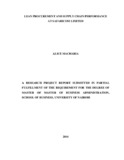| dc.description.abstract | In various organizations, lean has not only improved procedure, reduced inventory and
enhanced ergonomics, but it has also allowed the company to fine-tune its chemistry and
keep pace with changes in demand. However, despite its many benefits and continued
implementation Safaricom Limited, the company has many times experienced challenges
in relation to their service delivery. The study therefore sought to establish the lean
procurement practices used in Safaricom Limited; to establish the relationship between
lean procurement and supply chain performance at Safaricom Limited and to determine
the challenges facing lean procurement in Safaricom Limited. This research study used a
case study design. The target population of this study comprised of the staffs working in
Safaricom headquarters. This research study used stratified random sampling to select
20% of the target population and the sample size was 37 team leaders. The study used
both primary data and secondary data. Secondary data was obtained from the Safaricom
annual reports and financial statements. Primary data was collected using questionnaires.
The quantitative data in this research was analyzed by descriptive and inferential statistics
using Statistical Package for Social Sciences (SPSS version 20). Descriptive statistics
includes mean, frequency, standard deviation and percentages. Data was then presented
in tables, charts and graphs. Content analysis was used in processing of qualitative data
results were presented in prose form. Regression analysis was also used to establish the
relationship between lean procurement and supply chain performance at Safaricom
Limited. The study established that there is a positive significant relationship between
lean procurement and supply chain performance. The study also established that
Safaricom was lean procurement practices like involvement and empowerment of
employees, supplier-firm relationship, pull system, total quality management, continuous
improvement, e-procurement and 5S. The study recommends that telecommunication
companies in Nairobi should ensure that they engage services of qualified individuals
who have the required expertise in the implementation of lean procurement practices that
can assist in making informed lean procurement. In addition, the government of Kenya
should also formulate policies to improve e-procurement. | en_US |

